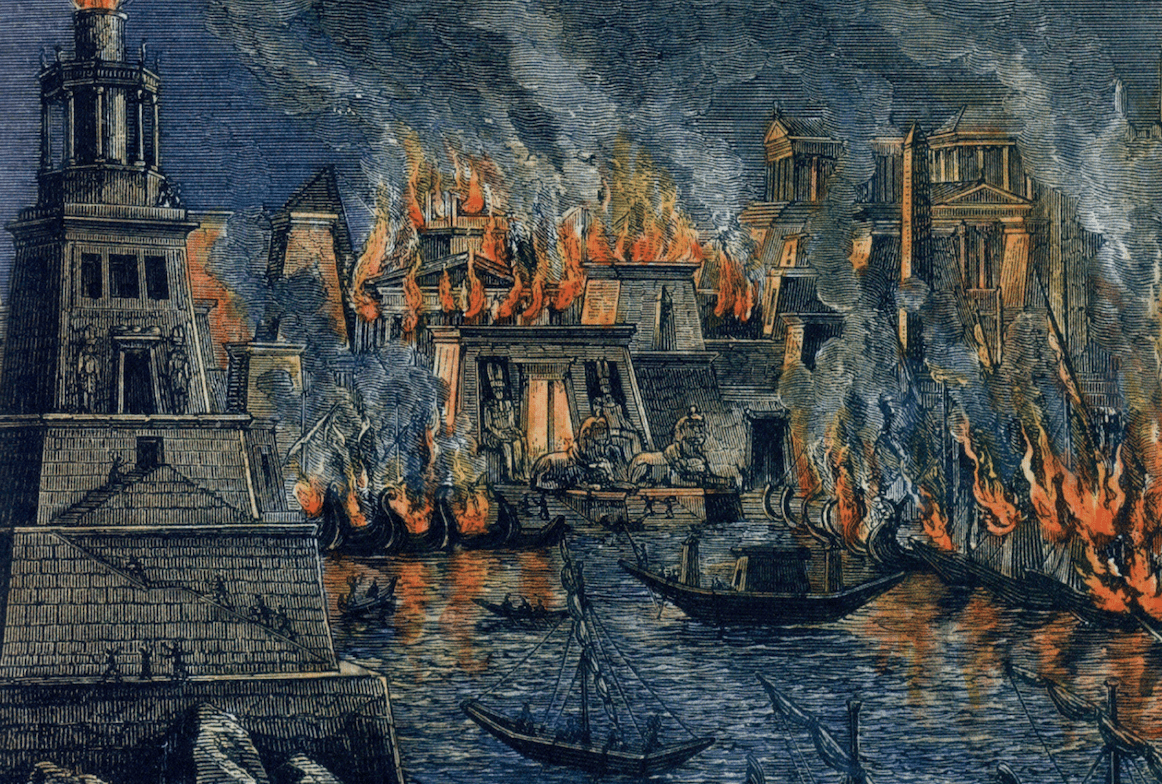
An archive of knowledge said to be so expansive, so awe-worthy, that upon its ruin the Queen of Egypt cried. As smoke took to the skies of Alexandria, Cleopatra lamented the ancient world’s most adorned library: Bibliotheca Alexandrina.
Bibliotheca Alexandrina – less formally known as the Library of Alexandria, Museum of Alexandria, or the Royal Library – was a colossal academic complex, comprising anything from 300,000 to 500,000 archived documents and several scholarly institutions (medical, astronomical, religious). It was considered the most significant bed of knowledge in the ancient world, gathering the greatest minds and re-defining the Hellenistic age. Today, it is still considered one of “the greatest intellectual achievements of mankind,” a library that was pure in its pursuit and dissemination of knowledge.
One of its remarkable developments is the bilingual marriage of Egyptian hieroglyphics and Greek; histories were translated, books exchanged, and unprecedented access to cultural mines otherwise unexplored was granted.
As its name suggests, the library was a fixture of Alexandria, the Ptolemaic ad-hoc capital of Egypt (supplanting Memphis). Much like the rest of Alexandria, the Bibliotheca Alexandrina was intended as a node of cultural, political, and literary learning. It sat on the coastline, initially dedicated as a shrine to the Greek Muses, goddesses of the arts, literature, and sciences. It was modeled after the Lyceum of Aristotle in Athens, later earning the title Seat of the Muses.


Although not the one to order its construction, Alexander the Great of Macedon had been the man to imagine it in his desire to secure Alexandria’s position as a capital of scholarship. Conflicting accounts struggle to pinpoint the exact date of its inception, but many scholars assume it was during Alexander’s first traverse into Egypt around 332 BCE.
He did not live long enough to see it realized, however; it was king Ptolemy II Philadelphus who brought the structure to life several generations later, in 283 BCE. Credited to this period of architectural innovation as well, was the Pharos of Alexandria: a wonder of the ancient world and the first lighthouse ever built.
The Bibliotheca Alexandrina relied on its vast collection of papyrus scrolls, growing even larger when the Library of Pergamon was integrated into the complex under Cleopatra. Although much smaller than the Bibliotheca Alexandrina, the Library of Pergamon was profiled as its primary competition. Founded in the city of Pergamon, (now: Begama in Turkey), it was said to contain upwards of 200,000 documents. During Cleopatra’s feverish affair with Marc Antony, accounts claim she was gifted the Library of Pergamon per Antony’s orders.

As with many of the great monuments and relics of the time, however, the library did not survive to the present day. Due to a vicious dispute over the Egyptian throne between Cleopatra and her brother Ptolemy XII Auletes, a civil war broke out in Alexandria. In an effort to support Cleopatra and subdue Ptolemy’s supporters, Roman General Julius Caesar ordered the burning of all Greek warships on the coast.
The fire did not remain at sea.
Plutarch documents that the fire extended all the way into the city, and given the library’s proximity to the coastline, it was inevitable collateral damage. As a Greek biographer, Plutarch is credited as the father of essay-writing and bio-historical documentation. His credibility during such events has only since been supported by scholars, and remnants of Plutarch’s influence extend into modern literature through the works of Montaigne, Shakespeare, and Goethe.

Despite his keen documentation, many contend whether or not Plutarch’s recollection was the true and final fall of the Library of Alexandria or whether it continued to exist in some capacity afterwards. The consensus, however, is that the complex never returned to its former glory.
Exact estimates of the Bibliotheca Alexandria’s size and itinerary after the fire have been difficult to discern; the Callimachus’ Pinakes, the library’s central index, has been lost. It is said that only one percent of the Bibliotheca Alexandrina’s collection remains in circulation today.
Lamentations about the burning of Bibliotheca Alexandrina are common talking points among historians and scholars alike; to many, it symbolizes the loss of millennia worth of knowledge, some of which the modern world will never gauge.






Comments (2)
[…] of Alexandria, which opened its doors in 2002. The Bibliotheca is a modern recreation of the Great Library of Alexandria, Egypt’s first universal library established between 285 and 246 […]
[…] https://egyptianstreets.com/2021/11/23/library-of-alexandria-a-lost-millennium-of-knowledge/ […]